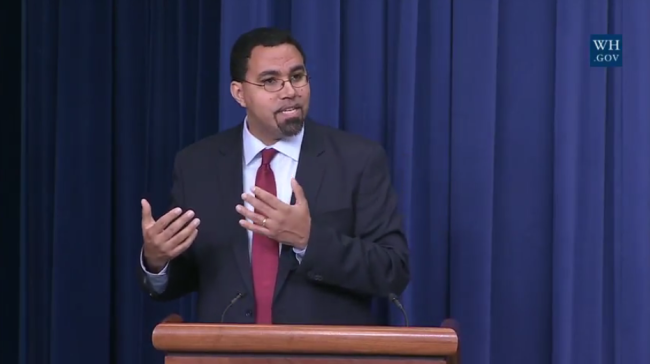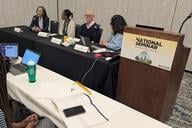You have /5 articles left.
Sign up for a free account or log in.

U.S. Secretary of Education John B. King Jr.
White House
WASHINGTON -- In a Dear Colleague letter released Friday, John B. King Jr., U.S. secretary of education, urged institutions to go “beyond supporting diversity through admissions and enrollment alone” and to “ensure that campuses are safe, inclusive and supportive environments that encourage student success and college completion.”
The letter -- and an accompanying 89-page report -- touted the Obama administration’s work on attempting to improve campus diversity over the past eight years, and included several recommendations for institutions going forward. The White House also hosted a summit here on Friday, with officials from the outgoing administration calling on colleges to continue the work in their absence.
While the summit largely steered clear of directly referencing Donald Trump, anxiety over how the president-elect will approach diversity and inclusion was apparent throughout the event. Referring to “the elephant in the room,” Theodore Shaw, director of the University of North Carolina at Chapel Hill's Center for Civil Rights, said that “some tough times are coming.” Many speakers at the gathering also called on college leaders to not ignore the past when looking toward the future of campus diversity efforts.
“We’ve got to stand up on behalf of our students who are the most vulnerable,” King said. “We’ve got to stand up for our students of color and insist on safe environments for them. We’ve got to stand up for our female students and insist on environments free of sexism. We’ve got to stand up for our students who are in religious minority groups who may be wrongly persecuted based on their religion. We’ve got to stand up for our students, regardless of sexual orientation or gender identity. We’ve got to stand up for our students regardless of their immigration status. We've got to stand up for the students who are the most vulnerable. If not us, who? If not now, when? ”
King also said that colleges must “respond to incidents of hate and racial harassment,” pointing to increased reports of such behavior on college campuses in recent weeks.
The education secretary's comments echoed those he made last week while speaking at the annual meeting of the Association of Public and Land-grant Universities, where he said that all students -- regardless of race, gender, nationality, sexual orientation or gender identity -- deserve to be treated with respect. Higher education leaders need to send "a clear message," King said Nov. 15, that campuses will not tolerate harassment, that "diversity is a value" and that they will "respond aggressively to places where safety is violated."
Among the department’s specific recommendations on Friday were that colleges allocate resources to provide academic, social and emotional support for minority and first-generation students; make building a diverse faculty and staff a priority; and train students, faculty, staff and leadership on “how to support diverse student populations and address the implicit biases we all carry with us.”
The department also recommended that colleges create “venues for safe and open dialogue on issues of race and discrimination among students, faculty, staff and leadership of different backgrounds, while at the same time respecting the right to free speech.”
Such “safe spaces” have proven to be a contentious concept in higher education. Asking an institution to create a safe space was among the top demands by students protesting racial inequality on college campuses last year. The idea has found both intense support and opposition from faculty and college leaders. In August, John Ellison, dean of students at the University of Chicago, set off a national debate when he wrote in a letter to incoming freshmen that the university does not “condone the creation of intellectual safe spaces where individuals can retreat from ideas and perspectives at odds with their own.”
King went farther than just referring to intellectual safety, adding that educators “have a responsibility to make sure schools are safe and supportive places for all,” and that colleges must ensure students “never fear being threatened or attacked.” Two recent college graduates speaking at the event recalled being victims of racial slurs while they were student government presidents at their respective colleges.
“Now, more than ever, we have to talk about how to improve the culture,” said Payton Head, former president of the University of Missouri Students Association. Head’s Facebook post about being called a racist slur last year helped spark the protests that eventually led to the ouster of the university system’s president and the Columbia campus’s chancellor.
Though King and the department pushed college leaders on Friday to think about inclusion beyond just enrollment, admission practices were not forgotten during the summit. Lee Bollinger, president of Columbia University, argued that college leaders too frequently avoid discussing the history of racism in the United States when debating race-conscious admissions and other diversity efforts.
Bollinger said college leaders are afraid to bring history into the discussion because “every general counsel will tell you, ‘Do not say you’re seeking diversity because of the past,’” as such an argument -- which other panelists at the event compared to reparations -- may have trouble meeting the standard, set by the U.S. Supreme Court, requiring such efforts be “narrowly tailored” to “further a compelling governmental interest.” As president of the University of Michigan, Bollinger was famously at the center of two U.S. Supreme Court cases on the constitutionality of the university's use of affirmative action. The university won one and lost one.
“That’s what general counsels tell us, and that’s what’s in the air,” Bollinger said. “And that is terrible, because it makes the entire discussion of this seem empty.”
Not all colleges are ignoring racism and historical context when making admissions decisions. In September, for example, Georgetown University explicitly acknowledged its own racist history when it announced that it would award preferential treatment in the admissions process to the descendants of 272 enslaved people whose sale the university profited from nearly 200 years ago.
But acknowledging those histories while keeping diversity efforts “narrowly tailored” can be like walking “a tightrope,” said Nancy Cantor, chancellor of Rutgers University at Newark. Cantor’s campus is one of the most diverse in the country, with no predominant racial or ethnic group.
“How do we walk that tightrope between leading institutions to be narrowly tailored and yet building the kind of inclusive institutions we’re talking about?” Cantor said. “We can’t walk a narrowly tailored path and protect the undocumented students on my campus. We can’t walk a narrowly tailored path and make sense of higher education as a legitimate institution in a community still facing the architecture of segregation. The issues of building diversity and inclusion cannot be separated from the issues of building community and civic dialogue, and crossing differences, and strengthening integration with the broader community and world.”




